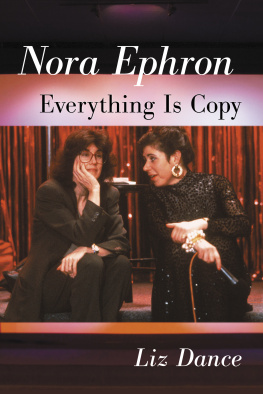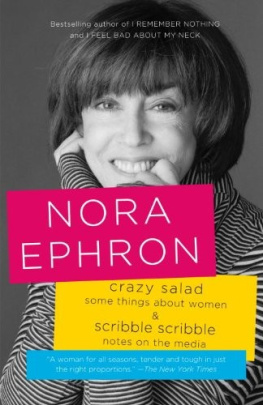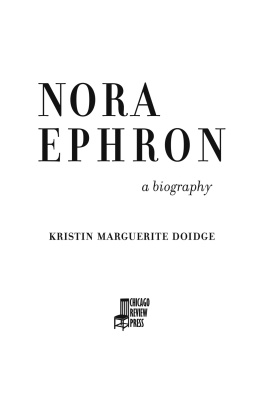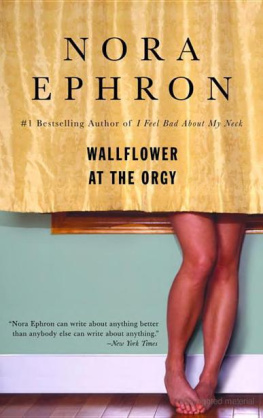
Nora Ephron
Everything Is Copy
LIZ DANCE

McFarland & Company, Inc., Publishers
Jefferson, North Carolina
LIBRARY OF CONGRESS CATALOGUING DATA ARE AVAILABLE
BRITISH LIBRARY CATALOGUING DATA ARE AVAILABLE
e-ISBN: 978-1-4766-1929-3
2015 Liz Dance. All rights reserved
No part of this book may be reproduced or transmitted in any form or by any means, electronic or mechanical, including photocopying or recording, or by any information storage and retrieval system, without permission in writing from the publisher.
Front cover: Nora Ephron (left) and Julie Kavner on the set of the 1992 film This Is My Life (20th CenturyFox/Photofest)
McFarland & Company, Inc., Publishers
Box 611, Jefferson, North Carolina 28640
www.mcfarlandpub.com
For David, Eli and Missy.
Because you thought I should.
Acknowledgments
My thanks go to Dr. Geoff Mayer for encouraging me in my Ephron endeavors for the past fifteen years. My thanks also to Dean Brandum for his amazing editing skills and David Ali for his unwavering support.
Preface
Everything is copy: Nora Ephrons famous quote succinctly sums up her approach to her work. Perhaps more so than anyone else, Ephron knew that, as a writer, everything that happens to youeverything you see or hear or experienceis material for your work, indeed its finest raw ingredients.
Ephron used her life as source material for her work, a claim not in dispute. However, in doing so, she also maintained authority over her life story. This was very important to Nora. She had the monopoly on what we know about her. Charlie Rose, the high-profile New Yorkbased journalist and interviewer whose weekly interview show is aired in the United States on PBS, asked Ephron, Who gets you? Nora squirmed, something she rarely did, and then dismissively said she didnt bother with such things. But such things did bother her. Nora had control of her story, but not when she was a child. This is important. As a child, Noras life was owned by her parents. They used her life as the basis for their most successful original works, the plays Threes a Family and Take Her, Shes Mine. Ephron repeatedly claimed that having incidents from ones life used as source material in the work of others was part and parcel of growing up in a family of writers. Her own work indicates that, in fact, she was far more conflicted about the issue than she was prepared to directly acknowledge.
Ephron had a vested interest in keeping control of her story. As she writes in Heartburn: If I tell the story, I control the version. Because if I tell the story, it doesnt hurt so much. Because if I tell the story, I can get on with it. Nora took control of her story through writing and filmmaking and, in doing so, left little room for anyone else to write an alternate version.
What does it mean when you say, Everything is copy? When the phrase (attributed by Nora to her mother) is closely examined its implications become evident. The concerns of Noras life were present in her work and they always had been. In 2010, it became obvious something was wrong: Nora was ill. The collection of essays published as I Remember Nothing is overwhelmingly darkdeath and cancer surrounded her. It was a time when a number of Noras friends were ill or had died. Nora rarely wrote about things that werent of concern to her personally, that didnt affect her directly. The processing of personal issues and concerns had always been a function and defining characteristic of the Ephron modus operandi. Jacob Bernstein recently wrote that there were hints of his mothers ill health in her work, which has no doubt prompted others to look for clues. This book traces the genesis and form and function of this idiosyncratic Ephron credo.
Introduction: Everything Is Copy
Would you go so far as to say your background [Henry and Phoebe Ephron] played no part in your entre to that career?
No partnot remotely. Their career had ended in the 60s, and my first movie, Silkwood, didnt come along until 1983.Nora Ephron
Contrary to the statement above, Nora Ephrons life and experience as the child of screenwriters Henry and Phoebe Ephron does inform her work. The experience of her childhood is fundamental in the shaping of her creative voice.
Ephron was not and will not be the only writer or filmmaker to use her life as source material for her work. She was quoted as saying, Everybody writes about their life, thats what writers do. However, it is not whether all writers use incidents from their lives as material that is important. What is crucial is that Nora was taught to use life as raw material by her parents; there are idiosyncrasies in her work which directly link her work to that of her parentsidiosyncrasies belonging to her alone.
Over and above the external factors that provided the opportunity for Nora to pursue her career and establish herself as an artist are the circumstances of her upbringing that shape her work. As a child Nora was not only part of a family with its own unique culture, she spent time, although it would seem at times unwillingly, absorbing the craft of filmmaking:
Sometimes we used to go hang out. We certainly had been on sets growing up and had met Jimmy Stewart, and we met Fred Astaire who was in Daddy Long Legs [1955] which is a movie they wrote. Thats kind of a divine movie. And when my father was producing Carousel [1956], which they did the screenplay for, I remember sitting in the mix and they were mixing a scene in Carousel and watching thirty-five times as they did it over and over and over and crying every single time. I certainly knew something about making movies but I didnt really know anything about it at all.
By the time she was eleven years old Nora was taking an active role in the family business, whether invited or not. Nora tells a story of how she tried to help her parents career. What is evident from her story is that, at an early age, Nora was already evaluating the quality of the work in a field she would later enter herself.
When I was about ten or eleven, I read one of their unproduced plays and was so outraged it had never appeared on Broadway that I sent it to a famous Broadway producer. My parents were beyond embarrassed.
Well before anything else, Nora Ephron was a child influenced by the life she led as Henry and Phoebes first daughter. Without understanding her familial background it is not possible to access the core premise of Ephrons credo everything is copy nor is it possible to understand the full implication of that premise as it applies to her work.
At its most simplified everything is copy can be understood to mean that Ephron dares to draw on and barely disguise what is close to her. At its most fundamental Nora Ephrons work is about herself. Nora Ephron was always in show business. She was a child of Hollywood. In a Peter Arno illustration used in the publicity package for the film adaptation of Henry and Phoebes 1943 Broadway hit Threes a Family, she is the baby being held by the stork. The two people with her are fictionalized representations of her parents.
The alternate name for this book could be Threes a Family, such is the intimate, prolonged and ultimately unacknowledged collaboration of Henry, Phoebe and Nora. Nora was integral in the career success of her parents just as they were fundamental to her success. Had Nora not lived the life she did with her parents her artistic voice would not be what it is. Had it not been for Nora,
Next page







